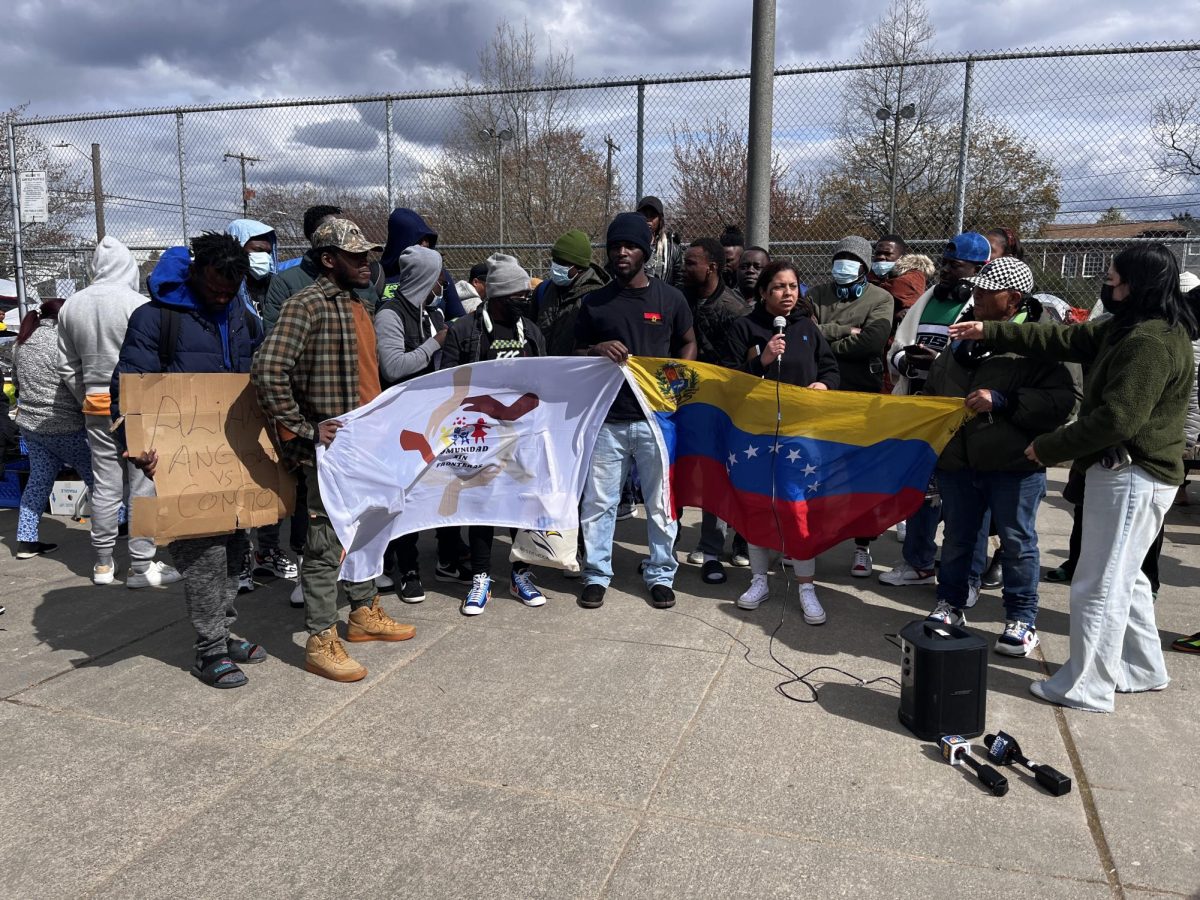Tuesday afternoon on April 2nd, over 150 migrants moved into the Garfield Community Tennis courts after payment for their hotels expired, with local religious institutions and shelters in the Puget Sound completely overwhelmed. They have since been able to pay for ten days of housing thanks to a large donation from an anonymous donor, but plan on returning to the tennis courts after their housing runs out.
“This is more than just what is happening right here [at Garfield] right now, but this is a crisis in King County and a crisis in Washington state,” said a speaker at a press conference on Wednesday at the Garfield Community Tennis Court.
The group that ended up at Garfield was not expecting they would have to resort to the tennis courts.
“We were staying at a hotel and we got…not the best news, and we have found ourselves in this situation,” said Adriana Figueria, a member of Comunidad Sin Fronteras (Community Without Borders). “At the church we were living in similar, if not the same conditions, and it’s just not something that we wanted or expected.”
The county has pledged to help, but the current housing being provided to them is not from the county or the city. Local individuals and religious organizations are the groups who have funded their housing for the next ten days.
“We are making sure that the community knows that the government is not providing any support. They continue to give us very short support that doesn’t come from the government,” said Rosario Lopez, a local activist. “The last donations haven’t come from King County.”
The King County website says they have put out a request for proposals on how to spend 1 million dollars they have allocated. According to King 5 and the King County website, the request for proposals has now closed, but an announcement on what the county will do is still weeks away. The State of Washington will not be providing funding until July. Those at the camp and their allies say that King County is not doing enough.
“King County keeps using the fact that they have allocated 1 million dollars for support for asylum seekers, we want to make it clear that that’s not enough,” said Lopez. “1 million dollars to house more than 600 people and to provide legal services, it’s not enough.”
Another issue that the migrants have is the inability to work. “We all want to work, we have energy to work, we have the strength to work, but we also know that we’re not allowed to work legally because we don’t have work permits,” said Garcia Kibala. “So we are respecting the laws of the land by not working, but that’s forcing us to live in these conditions and we do want to work.”
There was a misconception among some people that the migrants were camping as a demonstration, not out of necessity. Those who spoke wanted people to know that this was not the case.
“First of all, we want them to know that we are very sorry to be taking up space in their neighborhood,” said Figueria. “We chose this out of desperation and just to pick a place because we had nowhere to go.”
“Please King County, find us a solution, help us out,” said Marco, a migrant with the group Alianca de Acolhimento (Welcoming Alliance). “Stop making us a burden onto the organizations that keep providing us mutual aid with food and for the things that we need.”
This group of migrants have gone through lots of instability throughout their journey to and in the Seattle area.
“This is how we live. We walk with our clothes and our bags and our toothbrushes in our bags and our shoes in our bags, where there’s water, we wash ourselves. This is not a way to live,” said Kibala, taking his belongings out of a small bag to demonstrate.
“We found three different families, that were together, that had children under 5 sleeping in a park that didn’t have blankets,” said a speaker at the press conference. “They didn’t have a tent, they literally just had their clothes, their children and a blanket for nine people. So this is a crisis that is more than what you’re just seeing right behind us.”
Those representing the migrants say instability has been exacerbated by racism to this group of migrants. “We’re seeing this pattern where Brown and Black refugees and asylum seekers are not getting the support that other refugees are getting, when refugees from Ukraine came to the US a lot of communities were helping them,” said Lopez. “Why are we seeing Black and Brown children going hungry? Why did we have to have them sleep outside in tents in the rain? This is not a good condition for children to be in, they’re missing school, they’re being traumatized and our city officials are not listening to us.”
The migrants have not heard directions from any officials on what to do when they aren’t able to pay for housing anymore. Unless more money is allocated, they have no choice but to come back to the Garfield Tennis Courts.







